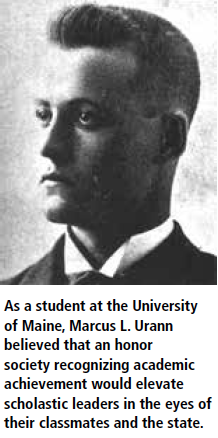History of Phi Kappa Phi
Phi Kappa Phi traces its origin to the University of Maine in 1897. Early in that year, a small group of seniors headed by Marcus L. Urann proposed that a society be formed to elect the ten highest-ranking seniors to an honor group. Following discussion with A.W. Harris, president of the University, and several interested professors, the Society of Lambda Sigma Eta was created. In 1899, the name of the group was changed to the Morrill Society, in honor of the senator who sponsored the act that created land-grant colleges. In 1900, the Society expanded to other campuses and adopted its present name, Phi Kappa Phi. It is significant that this expansion was the work of three college presidents: A.W. Harris of the University of Maine, C.W. Dabney of the University of Tennessee, and G.W. Atherton of Pennsylvania State College (now Penn State University). Now with chapters on more than 300 college and university campuses across the United States, Puerto Rico, and the Philippines, Phi Kappa Phi remains one of the oldest and most respected academic honor societies.
Marcus Libby Urann (1873-1963) spearheaded the establishment of the honor society as an undergraduate at the University of Maine. Trained as a lawyer, he gained further renown as a cranberry farmer, innovator and magnate who organized cranberry cooperatives that became Ocean Spray.
Originally published in the December 1924 Phi Kappa Phi Journal, Vol. IV, No. 4, and reprinted in the Spring 2015 issue of the Forum celebrating 100 years of the journal, The Ideal Behind Phi Kappa Phi_Marcus Urann.

